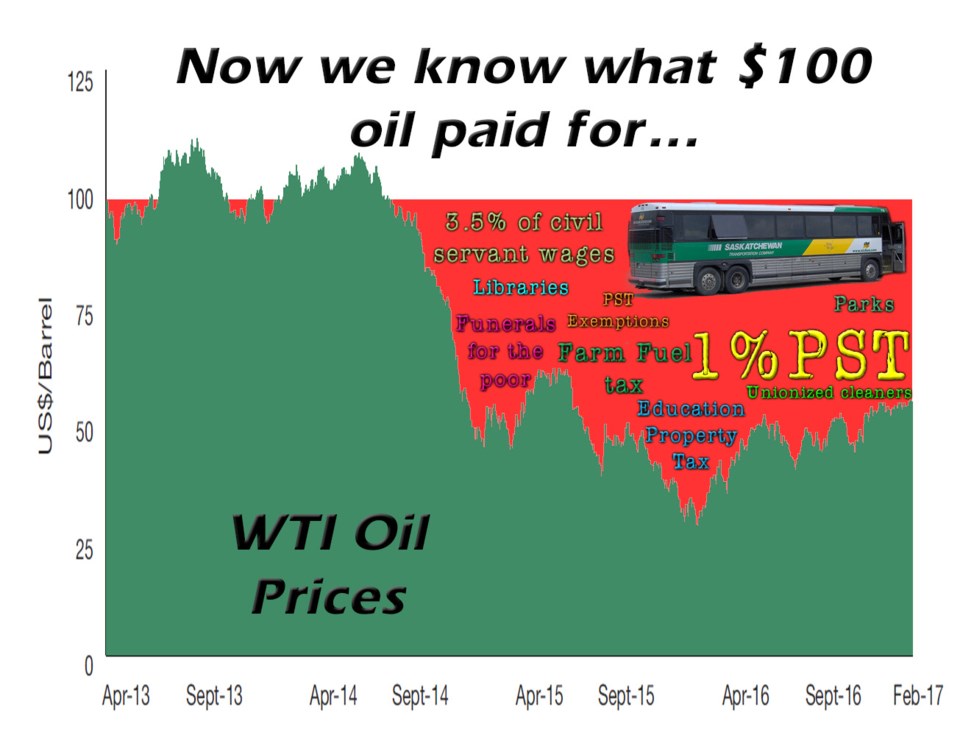So now we know what oil has been paying for.
But that’s only the half of it, quite literally.
Peppered throughout the 2017 provincial budget, which came down March 22, were numerous references to how low oil and potash prices have hurt the province’s revenue. I’m going to qualify that and point out it has been mostly oil, something I have been spouting off for at least a year.
I recall several years ago attending a presentation at the Regina Williston Basin Petroleum Conference. One of the keynote speakers was one of those oil forecasters whose job it is to predict what the price of oil will be, and where it is going. He explained that they way he predicts the price of oil is by simply following what the Saudi oil minister says. If the Saudi oil minister says oil will be $60 a barrel, that is what the price of oil becomes. If he says it will be $100 a barrel, it becomes $100 a barrel. OPEC follows.
Based on that enlightening knowledge, there is one person and one person, only, on this entire planet, that can make these budget issues go away, and it’s not Brad Wall. It’s the Saudi oil minister. Unless you can get him to ratchet up the price of oil, we are stuck with dealing with $50 oil, and the provincial revenues that number entails.
The hole in revenues for the past several years has been nearly entirely from oil, although low potash has had an impact too, and uranium to a much lesser extent.
This year oil is expected to bring in $670 million, which is an improvement from last years $557 million. We used to bring in $1.6 billion or more, per year, from oil and land sales. And for those who think we get a lot from uranium royalties? We don’t. It doesn’t even get its own line item on the revenue charts. It’s lumped in with “other” that includes things like coal and gold. Natural gas is now a rounding error.
Oil has dropped not only in value, but in volume as a result in the decline in price. In 2014-15 we produced 187.4 million barrels. The 2017-18 budget forecasts only 163.8 million barrels, a decline of 12.6 per cent in volume.
So for all those who don't like oil, we now know some of the things it paid for, and those are the things we are going to do without. And remember, we still have a very large $685 million deficit remaining, after these cuts. If the Saskatchewan party had truly cut to the bone, they would have had to double nearly all these numbers to hit break even status this year. ��
It means we paid less on PST. It means government workers got 3.5 per cent more in wages. It means our heavily subsidized Crown corporation bus service got its subsidies from oil. Our provincial library system got half its money from oil. Universities are losing funding, about five per cent, money that was covered by oil. Even funerals for those on social assistance were covered by oil revenues. ��
Oil revenue meant everyone paid less on their education property taxes.
If the cuts to public spending were anywhere near as harsh as what the oilfield has gone through, the cuts would have been a lot deeper. To eliminate the deficit entirely, it is likely the PST would have gone up two points, not one. Government workers would be facing pay cuts in the range of seven per cent, not 3.5. Universities would have seen a 10 per cent cut, not five. Raises? No one in government would see raises of any type, union contracts be damned.
All of those cuts are trivial compared to what the oilpatch has endured since 2014. Nearly every oilfield services business I have spoken to in the last year has cut their workforce by roughly half since 2014. Of those who remained, most took substantial cuts in pay, hours or both.
Those bemoaning the cuts in this year’s provincial budget are often the same type of people who don’t really like oil. I wonder, if they realized what oil has been paying for, they might change their tune now.
��
Brian Zinchuk is editor of Pipeline News. He can be reached at [email protected].




